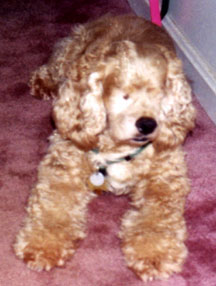Living with a Blind Dog
I wrote the following article for the Oldies But Goodies Cocker Rescue newsletter in the summer of 2003. A PDF version also appears on their website in the newsletter section

Life with Mickey
Mickey has always been my smart dog. He's the one that can open the child locks and Tupperware and dispense extra meals. He's the one that could get out of his crate and go exploring when the humans were not at home. He would unzip the school backpacks and liberate the leftover lunch treats without damaging the fabric. Mickey, my bright, shining "star". Mickey was 9 years old when glaucoma suddenly struck in September 2002.
We had no warning. He had been fine at the vet's office getting his toenails clipped one evening and two hours later he was walking into the walls and furniture. By the time I got him into the veterinary opthamologist's office the next day, the damage was done. Mickey's blindness was irreversible. In most cases, glaucoma strikes one eye and then the other. Mickey's case was unusual. Did I mention that Mickey is unique?
Glaucoma is a build up of pressure within the eye. Fluid enters the eye but is unable to drain in the proper manner. The resulting pressure causes pain similar to a migraine headache. The vet prescribed eyedrops and ointments. He warned that these medicines would only work for a few months and then we would have to consider surgery.
But first, Mickey--and his family--would have to adjust to life with a blind dog. Initially, Mickey spent a good deal of time alone in the bedroom, snuggling his fleecy "baby". He didn't come into the living room to be with the rest of us. Mickey's humans quickly learned to "be" his eyes. When we saw him walking a collision course, we would yell "Wall!" It was up to Mickey to stop and figure out where the obstacle was. On leash walks, we used "step up", "step down", "edge" and "STOP!" as buzz words. Mickey very quickly learned the meaning of each of these. The trickiest warning was "dog!" as he was about to crash into one of the other canines-in-residence. Luckily, the other dogs have been very forgiving.
Looking back, it's amazing how quickly Mickey learned his way around the house and yard. But then, he'd been living there for over 4 years. I joined an e-mail group for owners of blind dogs. The other members were very supportive and cautioned me against rearranging the furniture.
The real test came over Thanksgiving weekend. I took Mickey along to visit my family in another state. Normally, Mickey would stay home with the other dogs and a friend would come in several times a day. But I didn't feel right asking someone to administer the eye drops on Mickey's strict routine. Mickey had been to my parent's home once before, soon after I adopted him. He certainly didn't remember the place very well. It took him about 3 hours to map everything out. He learned right away where the stairs from the kitchen were. He stumbled there once; and never again. He seemed to count the steps leading from the deck to the back yard. The only time he had problems in this new environment was if the toddlers left toys in his path.
In March, the eye drops stopped working. Mickey retreated back to the bedroom and hung out alone (except for the fleecy toy). A trip to the vet's office revealed that his intraoccular pressures were once again elevated. It was time for surgery. Several options were discussed. Since Mickey was already blind, with no hope for recovery of his sight, the vet recommended double enucleation. Both eyes would be removed and the lids sewn shut. Mickey would always look like he was asleep. (He uses this to his advantage.)
Mickey spent the night after surgery at the vets. He came home the next day looking pretty "Frankenstein-ish". He had huge stitches and his face had been shaved.
But Mickey had adjusted to being blind months ago. Once the surgical swelling went down and the stitches were removed, Mickey felt much better. Within a few weeks, I "had my old dog back". Mickey was running up and down the length of the back of the sofa, barking at noises made by the neighbors. He was once again eager to gnaw on a rawhide or tumble his "buster cube" around the dining room. Of course, the other dogs would often steal those treats out from under his nose...
We bought Mickey a leather cap with a visor. He doesn't like to wear it much, but it is a conversation starter. People's reactions--when they realize that this active wigglebutt has no eyes--are generally the same: "wow!" I use the opportunity to enlighten them. Before the glaucoma, Mickey would go to elementary schools and scout troops to teach kids about rescue. Now, we have even more to talk about.
Twice this summer, Mickey has found grounded baby birds. On both occasions, he has been outdoors with one of the other resident cockers and on both occasions, the other dog never noticed Mickey's "find". Mickey, the cocker spaniel, bred through the centuries as a bird dog, still lives up to his bloodline. Mickey might be blind, but he's far from handicapped.
And the Tupperware still isn’t safe, either.
This page last updated 2/3/04  Get your own FREE Website at
Get your own FREE Website at 







